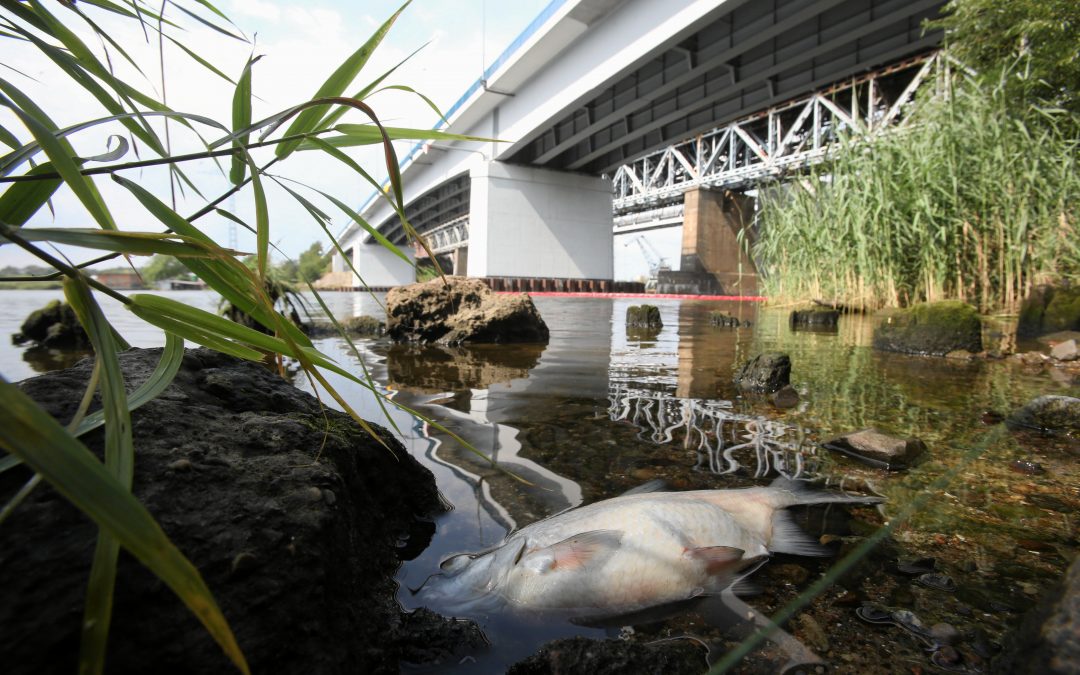Authorities in the Polish province of West Pomerania have appealed to the country’s government to declare a state of natural disaster for 30 days, covering the area affected by the poisoning of the Oder river. A similar appeal was issued by the head of Lubuskie province last week.
It would enable compensation to be paid to affected businesses and fishermen who say their losses amount to thousands of zloty a day. If this is not possible, the regional executive is calling for the introduction of a so-called “special law”, which will give tools to counteract the consequences of the disaster.
Meanwhile, the government plans to set up a permanent surface water monitoring system to prevent similar disasters in the future, the climate minister has announced.
The Polish Angling Association has already announced its intentions to claim compensation for losses suffered as a result of the poisoning of the Oder.
– Wsparcia potrzebują rybacy, restauratorzy, smażalnie ryb, organizatorzy spływów kajakowych. Ci ostatni mają skasowane wszystkie spływy do końca września. Nie wiadomo kiedy i czy będą mogli z wody korzystać. – @OGeblewicz #KatastrofaEkologiczna #Odra
— Pomorze Zachodnie News (@PomZachodnNEWS) August 17, 2022
“We will be applying to cover the cost of restoring fish stocks in the river,” the association said in a statement. “Anglers are very patient, we will certainly ‘fish out’ the perpetrators and those jointly responsible for this environmental disaster”.
The amount of potential compensation the association will fight for has not yet been announced. It will depend on the scale of the loss and the level of environmental pollution.
According to the association, the disaster was allegedly caused by “a lack of competence, commitment and appropriate action on the part of the state, above all Polish Waters” (the state body reponsible for water management).
Oświadczenie PZW w sprawie "polskiego Czarnobylu" jaki ma miejsce obecnie na rzece Odrze@MI_GOV_PL @WodyPolskie @Matu @FaktyTVN @RadioZET_NEWS @RMF24pl @PolsatNewsPL @gazetapl_news @rzeczpospolita @puls_biznesu @Int_Wydarzenia @wirtualnapolska @OnetWiadomosci pic.twitter.com/WRJj8h7eyQ
— Polski Związek Wędkarski (@pzworgpl) August 17, 2022
It is still not clear what caused the poisoning. The first dead fish in the Oder were observed near Oława at the end of July. Only after two weeks was a ban on entering the river, due to the potentially dangerous effects of water contact on health, introduced in the West Pomeranian, Lubuskie and Lower Silesian provinces. The river is still being cleaned of dead fish.
“It seems inconceivable to leave all these stakeholders around the river without the livelihoods they have been deprived of overnight,” said the regional government’s spokeswoman, quoted by radio RMF FM.
West Pomeranian governor Olgierd Geblewicz has also introduced a ban on amateur fishing on the Oder River and Port Lake in the Western Polish city of Szczecin from 13 August to 30 September.
For fishermen, the ban on angling means big losses. The chairman of the Szczecin Fish Producers’ Association, Paweł Kuźmiński, told TOK FM that for every fisherman it translates into losses of thousands of zloty every day.
“We are at the peak of the fishing season, for which we have been preparing for many months,” he added.
The head of Lubuskie province has appealed for a "state of natural disaster" to be imposed due to the poisoning of the Oder river
The Government Security Centre is sending alerts to residents warning against entering the Oder or using its water in any wayhttps://t.co/ZAHhn2kaDH
— Notes from Poland 🇵🇱 (@notesfrompoland) August 12, 2022
On Wednesday, committees in the parliament discussed the measures taken by the government in connection with the environmental disaster on the Oder.
During the committee’s meeting, deputy infrastructure minister Marek Gróbarczyk said that a “particular poisoning” must have occurred as it involves the high pH and oxygenation of the water.
“If it wasn’t natural conditions, it was simply the actions resulting from the title of the sewage treatment plant, which simply discharged hazardous substances, untreated…and this caused the poisoning,” said the deputy minister, as quoted by state news agency PAP, adding that fish die-offs were also recorded also earlier this year.
No pesticides were found in dead fish from the Oder and radioactive isotopes are below normal, says climate minister @moskwa_anna.
MPs from Poland's largest opposition party have been conducting inspections of government institutes over the poisoninghttps://t.co/CwGCqjpJcj
— Notes from Poland 🇵🇱 (@notesfrompoland) August 17, 2022
A different stance was taken by climate minister, Anna Moskwa, who said at a press conference on Wednesday that no pesticides were found in dead fish from the Oder and radioactive isotopes are below normal.
“We are moving further and further away from the toxic substance hypothesis, moving closer to the natural cause hypothesis. But we are not ruling out a toxic substance, looking for it by other means,” she said.
The minister announced, however, that the government wants to set up a permanent surface water monitoring system with an early response system for potential crises, failures and disasters. “We will be pioneers in the EU,” she said, adding that works on the system is to be started immediately.
Main photo credit: Cezary Aszkielowicz / Agencja Wyborcza.pl

Alicja Ptak is deputy editor-in-chief of Notes from Poland and a multimedia journalist. She has written for Clean Energy Wire and The Times, and she hosts her own podcast, The Warsaw Wire, on Poland’s economy and energy sector. She previously worked for Reuters.



















